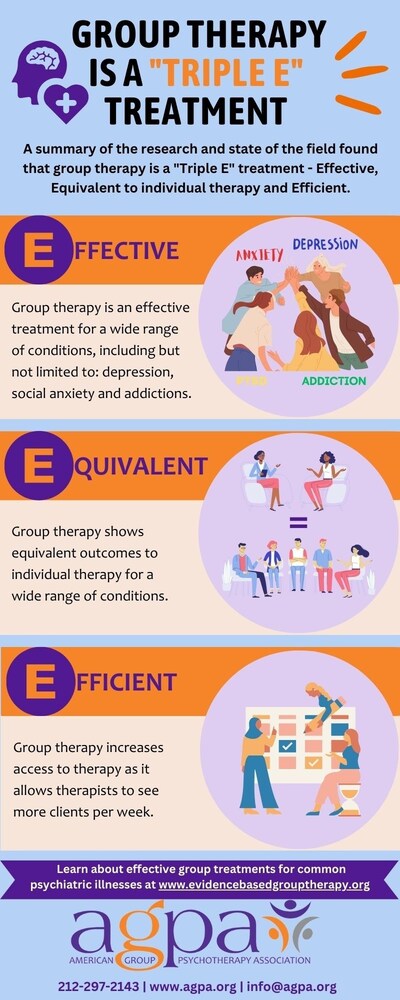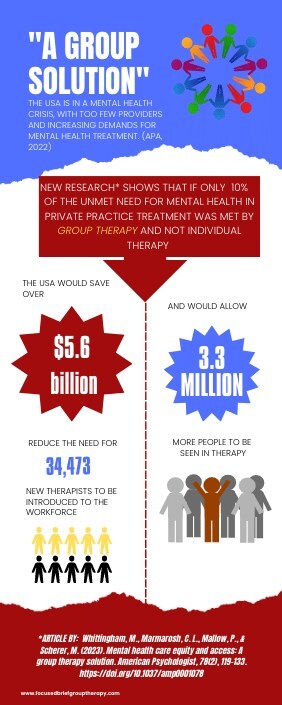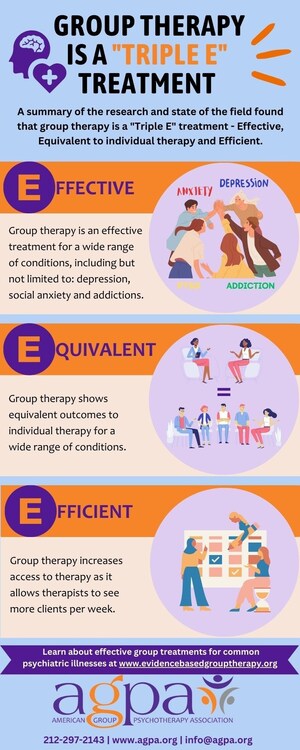NEW YORK, July 22, 2024 /PRNewswire/ -- The American Group Psychotherapy Association announced research demonstrating that group therapy is an effective mental health treatment that can respond to the mental health crisis in the US by increasing access to services while containing costs for patients, providers and third party payers.
According to the White House (FACT SHEET: Biden-Harris Administration Highlights Strategy to Address the National Mental Health Crisis | The White House), the USA is currently in the midst of an unprecedented mental health crisis (The State of Mental Health in America | Mental Health America (mhanational.org); Mental Health in America: A Growing Crisis (psychiatrictimes.com), with a drastic increase in demand for services while there is a workforce shortage in terms of availability of therapists to meet that demand. Mental health networks are also described as "ghost networks" by legislators, with up to 80% of therapists on provider networks unavailable due to full wait lists or no longer being in practice (Congress urged to tackle 'ghost networks' amid mental health crisis | The Hill.)
An analysis published in the leading American Psychological Association journal, American Psychologist shows that if 10% of the unmet need for psychotherapy in the US was met with group therapy and not individual therapy:
- 3.3 million more people would be served, providing significantly improved access to mental health treatment.
- The need to add new therapists to the workforce (currently at 34,473 additional therapists) would be reduced.
- Savings of over $5.6 billion in mental health care costs would be realized (Whittingham, Mallow, Marmarosh & Scherer, 2023).
Full citation: Whittingham, M., Marmarosh, C. L., Mallow, P., & Scherer, M. (2023). Mental health care equity and access: A group therapy solution. American Psychologist, 78(2), 119–133. https://doi.org/10.1037/amp0001078
Martyn Whittingham, Ph.D., CGP, Cheri Marmarosh, Ph.D., CGP, Pete Mallow, PhD. And Michael Scherer, Ph.D. are a research team who have been investigating the utilization and reimbursement of individual and group therapy across third-party payers. They modelled the impact of changing the way psychotherapy is delivered nationally.
Their analysis states that group therapy is underutilized by private practice. When looking at how individual and group therapy are used nationwide under third-party payment, only 2% of services in private practice are group therapy (most group therapy takes place in inpatient and structured outpatient agency settings like substance abuse clinics or hospitals, which is typically for clients whose conditions have become more chronic and /or severe). This leads to bottlenecks of care, as private therapists have full caseloads and become unable to take on new clients when their needs are less severe and can be managed in an outpatient setting.
As Dr. Martyn Whittingham states, "The USA has the means to increase access to mental health treatment. We need to incentivize more groups in private practices and for psychologists and social workers to use them more in primary care physician offices, where people often turn to for help before problems become chronic and severe. We also need therapists to get more training in learning group theories and processes so that they will run effective, evidence-based groups. We can also ensure quality by using outcome assessment for both group and individual therapies."
Group is not just efficient, it is a highly effective treatment option. A new Evidence-Based Group Treatment Website at https://evidencebasedgrouptherapy.org/. underscores the effectiveness of group as a treatment modality. This website has been developed by an international team of renowned mental health professionals and supported by the American Psychological Association's Society of Group Psychology and Group Psychotherapy (Division 49), the American Group Psychotherapy Association (AGPA), with funding provided by the Group Foundation for Advancing Mental Health, and the German Health Ministry. The development team was chaired by AGPA Past President Gary Burlingame, PhD, CGP, AGPA-DF's lab at Brigham Young University and Bernhard Strauss, PhD's lab at the Institute of Psychosocial Medicine, Psychotherapy, and Psycho-oncology at Jena University Hospital in Germany.
Group Therapy is a "Triple E" Treatment. The meta-analytic research and state of the field contained in this new website demonstrates that group therapy is:
Effective – Effective for a wide range of conditions, including but not limited to: depression, social anxiety and addictions
Equivalent – Equivalent outcomes to individual therapy for a wide range of conditions
Efficient - Group therapy increases access to therapy as it allows therapists to see more clients per week
In increasing the use of group in responding to the mental healthcare crisis, this website can serve as a resource for treatment information and the basis of trainings to increase practitioner's skill and comfort in providing group therapy. Moreover, agencies who provide the highest percentage of group treatment in the US could extend their group treatment offerings by employing evidence-based protocols found on the website for the most common psychiatric disorders.
Gary Burlingame, AGPA Past President, who has spent 25 years conducting meta-analyses researching the efficacy of group therapy stated, "Group therapy can play a major role in addressing the mental health crisis in which needs outpace availability of providers. This website is a valuable resource in providing access to information on the most effective treatments for common mental health challenges."
Media Contacts:
Diane Feirman, CAE
AGPA Public Affairs Senior Director
dfeirman@agpa.org
212-297-2143
Martyn Whittingham, PhD, CGP
Owner, Whittingham Psychological Services
mswhittingham100@outlook.com
513-827-1430
www.focusedbriefgrouptherapy.com
Cincinnati, OH
About AGPA
The American Group Psychotherapy Association (AGPA) is the foremost professional association dedicated to the field of group psychotherapy, operating through a tri-partite structure: AGPA, a professional and educational organization; the Group Foundation for Advancing Mental Health, its philanthropic arm; and the International Board for Certification of Group Psychotherapists, a standard setting and certifying body. AGPA represents over 2,000 mental health professional members including psychologists, psychiatrists, and social workers, as well as mental health, family, and pastoral counselors, many of whom have been recognized as specialists through the Certified Group Psychotherapist credential. Its members are experienced mental health professionals who lead psychotherapy groups and various non-clinical groups. Many are organizational specialists who work with businesses, not-for-profit organizations, communities and other "natural" groups to help them improve their functioning. The association also has 21 local and regional societies located across the country.
AGPA is committed to supporting the dignity and psychological safety of every individual without discrimination regarding race, ethnicity, gender, religion, sex, age, or disability. Central to our mission is a belief in the power of groups to treat mental illness, heal the scars from traumatic events, and enhance the well-being of adults and children in their families, schools, corporate settings, and communities.
SOURCE AMERICAN GROUP PSYCHOTHERAPY ASSOCIATION

WANT YOUR COMPANY'S NEWS FEATURED ON PRNEWSWIRE.COM?
Newsrooms &
Influencers
Digital Media
Outlets
Journalists
Opted In








Share this article